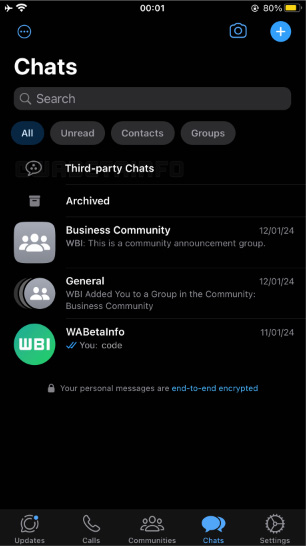WhatsApp to roll out ability to send messages from third-party apps
Future update under development for WhatsApp users having on iOS
A future update on WhatsApp will reportedly allow users to receive messages sent from third-party apps via an upcoming feature for the Meta-owned messenger, WABetaInfo reported.
A feature named "third-party chats" is in the works and a new section containing all incoming messages from other messaging apps will be included in WhatsApp will be rolled out in future.
that the latest beta update for iOS, which is available on the TestFlight app, revealed that WhatsApp is working on bringing the said feature to a future version of the iOS app.
The update comes as part of compliance to the Digital Markets Act (DMA), a law that regulates the behaviour of large tech companies, particularly those considered “gatekeepers”, which have a significant impact on the digital market.
As per the WhatsApp news tracker, a key aspect of the DMA is the requirement for these companies to enable users to communicate with each other using various apps.
WhatsApp is mentioned as one of the companies that will be subject to the regulations outlined in the DMA, as the platform holds a dominant position in the messaging market.
"One key benefit stemming from the DMA and WhatsApp’s efforts to comply is the introduction of interoperability."
The term "interoperability" means the users' ability to communicate with other people on different messaging apps while using WhatsApp, which facilitates more inclusive and diverse communication channels and enhances the overall user experience.
However, WABetaInfo warned that the users will have to maintain control over this feature, as they are required to manually enable the interoperability service and have the option to opt out, as stipulated in Article 7 of the regulations.
Moreover, end-to-end encryption will have to be preserved in interoperable messaging systems, ensuring a good level of security for users engaged in cross-platform communication.
-
Shanghai Fusion ‘Artificial Sun’ achieves groundbreaking results with plasma control record
-
Polar vortex ‘exceptional’ disruption: Rare shift signals extreme February winter
-
Netherlands repatriates 3500-year-old Egyptian sculpture looted during Arab Spring
-
Archaeologists recreate 3,500-year-old Egyptian perfumes for modern museums
-
Smartphones in orbit? NASA’s Crew-12 and Artemis II missions to use latest mobile tech
-
Rare deep-sea discovery: ‘School bus-size’ phantom jellyfish spotted in Argentina
-
NASA eyes March moon mission launch following test run setbacks
-
February offers 8 must-see sky events including rare eclipse and planet parade













